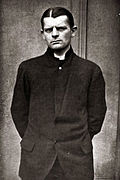Wikipedia:Today's featured article/November 6, 2014: Difference between revisions
Bencherlite (talk | contribs) shuffle |
Bencherlite (talk | contribs) Gough Whitlam |
||
| (One intermediate revision by one other user not shown) | |||
| Line 1: | Line 1: | ||
{{TFAIMAGE|Carl Hans Lody.jpg|Carl Hans Lody}} |
{{TFAIMAGE|Carl Hans Lody.jpg|Carl Hans Lody}} |
||
'''[[Carl Hans Lody]]''' (1877–1914) was a reserve officer of the [[Imperial German Navy]] who spied in the United Kingdom at the start of the [[First World War]]. While working for a shipping line, he agreed to spy for German naval intelligence, and was sent to [[Edinburgh]] in late August. He spoke fluent English, and spent a month posing as an American tourist while reporting on British naval movements and coastal defences. He had not been given any espionage training and was detected almost immediately, as he sent his communications in plain English and German to a known German intelligence address in Sweden. By the end of September 1914, a rising spy panic in Britain led to foreigners coming under suspicion; he attempted to go into hiding in Ireland but was quickly caught. Tried in a public court martial in London, he made no attempt to deny his guilt, declaring that he had acted out of patriotic motives. His courage on the witness stand attracted admiration in Britain and Germany. He was sentenced to [[Execution by firing squad|death by firing squad]] and on 6 November 1914 he became the first person in nearly 170 years to be executed at the [[Tower of London]]. Under the [[Nazi Germany|Nazi regime]], he was acclaimed as a national hero. {{TFAFULL|Carl Hans Lody}} |
'''[[Carl Hans Lody]]''' (1877–1914) was a reserve officer of the [[Imperial German Navy]] who spied in the United Kingdom at the start of the [[First World War]]. While working for a shipping line, he agreed to spy for German naval intelligence, and was sent to [[Edinburgh]] in late August. He spoke fluent English, and spent a month posing as an American tourist while reporting on British naval movements and coastal defences. He had not been given any espionage training and was detected almost immediately, as he sent his communications in plain English and German to a known German intelligence address in Sweden. By the end of September 1914, a rising spy panic in Britain led to foreigners coming under suspicion; he attempted to go into hiding in Ireland but was quickly caught. Tried in a public court martial in London, he made no attempt to deny his guilt, declaring that he had acted out of patriotic motives. His courage on the witness stand attracted admiration in Britain and Germany. He was sentenced to [[Execution by firing squad|death by firing squad]] and on 6 November 1914 he became the first person in nearly 170 years to be executed at the [[Tower of London]]. Under the [[Nazi Germany|Nazi regime]], he was acclaimed as a German national hero. {{TFAFULL|Carl Hans Lody}} |
||
Recently featured: [[ |
Recently featured: [[Gough Whitlam]] – ''[[Bonshō]]'' – [[Bivalvia]] |
||
{{TFAfooter|Month=November|Year=2014}} |
{{TFAfooter|Month=November|Year=2014}} |
||
Latest revision as of 14:13, 29 October 2014
Carl Hans Lody (1877–1914) was a reserve officer of the Imperial German Navy who spied in the United Kingdom at the start of the First World War. While working for a shipping line, he agreed to spy for German naval intelligence, and was sent to Edinburgh in late August. He spoke fluent English, and spent a month posing as an American tourist while reporting on British naval movements and coastal defences. He had not been given any espionage training and was detected almost immediately, as he sent his communications in plain English and German to a known German intelligence address in Sweden. By the end of September 1914, a rising spy panic in Britain led to foreigners coming under suspicion; he attempted to go into hiding in Ireland but was quickly caught. Tried in a public court martial in London, he made no attempt to deny his guilt, declaring that he had acted out of patriotic motives. His courage on the witness stand attracted admiration in Britain and Germany. He was sentenced to death by firing squad and on 6 November 1914 he became the first person in nearly 170 years to be executed at the Tower of London. Under the Nazi regime, he was acclaimed as a German national hero. (Full article...)
Recently featured: Gough Whitlam – Bonshō – Bivalvia

